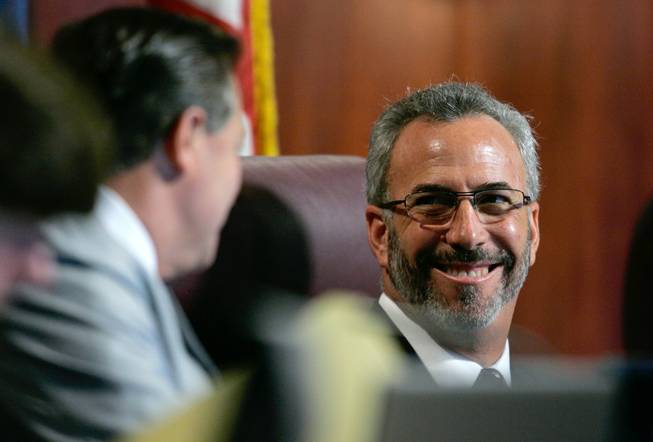
Las Vegas City Councilman Steve Wolfson interacts with Councilman Steve Ross during a city council meeting last month.
Thursday, Sept. 11, 2008 | 2 a.m.
Beyond the Sun
Until recently in Las Vegas, it took on average almost a year for motorists arrested for misdemeanor drunken driving to be charged with a crime.
Plenty of time for those who claimed innocence to prepare to contest the charges. Plenty of time, too, for those with serious problems to have gotten back on the roads drunk.
Earlier this year, Councilman Steve Wolfson brought officials together to tackle the issue. He knows it well as an elected official and as a defense lawyer who sometimes represents people charged with DUI.
Wolfson began wondering whether there was a serious backlog of misdemeanor DUI cases, and if so, what had caused the slowdown and what could be done to fix it.
The head of the city attorney’s criminal division, Ben Little, told him on average misdemeanor DUI charges came 11 months after the date of arrest.
So in February, Wolfson convened the first of several meetings with representatives of Metro’s traffic bureau, the city attorney’s office and Las Vegas Municipal Court to see whether they could reduce the backlog of cases and speed newer ones through the process.
Bottom line: They have. In the past seven months, that wait time has been cut to a little more than four months, officials confirm.
This is beneficial for several reasons, officials said. First, the accused — and victims — can have their day in court sooner.
When there’s a guilty verdict, punishment for the offenders, and often treatment and counseling as well, is meted out more quickly, which can mean life or death for other drivers on the road with them.
And the system simply runs more efficiently, a good thing for taxpayers.
“I’m very, very happy with the progress we’ve made,” said Wolfson, noting that his interest in the issue stems from his service on the council and not as a defense attorney.
Getting the courts involved earlier, Wolfson said, often helps provide the mix of education, deterrence, rehabilitation and treatment some offenders need to change their behavior.
It’s a public safety issue that needed to be addressed, Wolfson said. “As long as I’m on the council, this will be a permanent fix” to the problem.
In fiscal year 2007, city prosecutors filed 4,679 misdemeanor DUI cases with Municipal Court, according to figures provided by court officials. That’s up from the 2,306 cases filed in fiscal 2004.
“This is important. All of us were anxious to be involved,” said Municipal Court Administrator James Carmany. “Whatever we need to do to prevent someone from drinking and getting behind the wheel, we should.”
A DUI is typically classified as a misdemeanor if it is a first or second offense and if no one is seriously injured.
More serious drunken driving cases, including those of defendants facing at least their third charge, often are referred to the Clark County district attorney’s office, which brings felony charges.
According to prosecutor Little, the city attorney’s office receives 5,000-5,500 DUI cases annually from Metro and, to a lesser extent, the Nevada Highway Patrol. In about 85 percent of those cases, charges are brought in Municipal Court, he said.
First-time misdemeanor drunken drivers typically face as much as a $580 fine and either two days in jail or 48 hours of community service. They also often are ordered to attend DUI “school” and can have their driver’s license revoked for 90 days.
A large percentage of these cases is settled before trial, though neither court administrators nor prosecutors could, on short notice, say exactly how many.
Several factors caused the slow processing of DUI cases, Little said. On Metro’s end, before the cases were referred to prosecutors, its lab was clogged with the historically low-priority cases of defendants who chose to have their blood, as opposed to their breath, analyzed for alcohol content.
And once the case got to the prosecutor’s office, Little said the staff had been hampered by a number of key resignations.
In agreeing to speed up their end of things — including fast-tracking newer cases to the charging stage within 30 days of receiving them and reducing the 2,700-case backlog — Little said he’s resorted to taking his work home with him. His office isn’t through the backlog, he said, but is closing in.
One longtime local defense attorney who handles DUI cases said that, perhaps counterintuitively, some of his clients could be ill-served by having their cases resolved more quickly.
Those clients, he said, could use the extra time to finish their treatment programs and get reliably sober before seeing a judge, attorney Bill Terry said.
Terry added that most drunken drivers don’t typically reoffend soon after their initial arrest, so a delay before the charging stage likely wouldn’t put the public at risk that often.

Join the Discussion:
Check this out for a full explanation of our conversion to the LiveFyre commenting system and instructions on how to sign up for an account.
Full comments policy